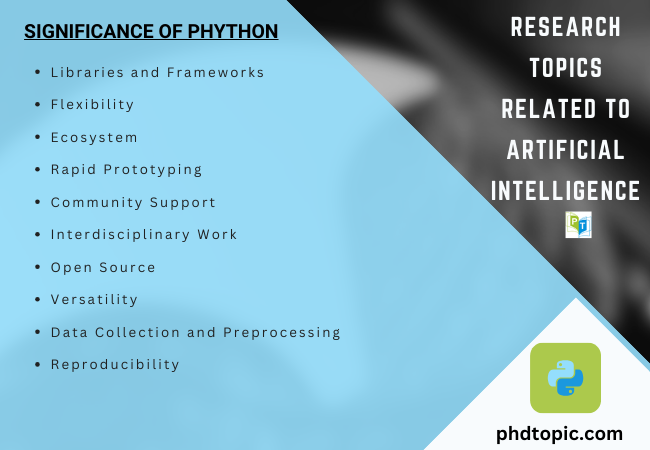For budding scholars research topics in python serves a best idea. Our experts suggest you some kick-starter Python Project Ideas to work with. Our professionals have a strong python foundation for over 15+ years. An open care support for the entire project will be given. Get your conference paper ready by phdtopic.com to avoid errors and gain a higher grade. All types of databases are supported by us in python to work with.phdtopic.com has the best infrastructure and a good framework to build up python AI projects. These below listed points will help you learn python development in no time as per our guidance.
Several reasons are listed below why you should consider python.
Libraries and Frameworks
A wide set of libraries and frameworks are covered under python mainly designed for AI and machine learning, such as TensorFlow, PyTorch, scikit-learn, Keras, and more. These libraries are frequently updated and well-maintained with new features, by making it easier for researchers to apply its algorithms.
Flexibility
One can keenly focus on the logic and algorithmic as its flexible characteristics get bogged down with the details of the language itself.
Ecosystem
For data manipulation (Pandas), scientific computing (NumPy, SciPy), and visualization (Matplotlib, Seaborn), python provides libraries for machine learning due to its rich network system.
Rapid Prototyping
Hypotheses can be tested and be experimented with algorithms as Python enables fast prototyping, this serves as a vital feature in research settings.
Community Support
Python is extremely supportive when we are stuck or venturing into a new subfield of AI as it is very huge with substantial community contributions and support, as well as countless tutorials, forums, and pre-built packages.
Interdisciplinary Work
A scholar can consider work in various subfields by combining AI with fields like biology, finance, or healthcare as Python is a huge advantage
Versatility
For scripting and building large-scale, performance-critical applications we can use python. Python serves as a full-fledged application if your project needs it.
Open Source
Python is an open-source programming language, it is cheap to conduct research. This characteristic proves to mainly helpful when working together with other researchers don’t have access to proprietary software.
Data Collection and Preprocessing
Python suggests us with a widespread library which are effective for web scraping, data collection, and data preprocessing, in a majority of the AI projects it is a crucial task. Libraries such as BeautifulSoup, Scrapy, and Selenium are widely used for these precise purposes.
Reproducibility
The most vital aspect of scientific research is popularity and legibility which is facilitated in python.
Hope you will be understanding the huge benefits of python now, get a wide variety of python related AI projects ideas and topics with the correct source code by our leading developers at phdtopic.com. Once you contact us, we will provide our scholars with a wide list of python programming projects ideas if you are a beginners, students or researches. A clear and easy structure of source code with proper explanation from our side will be given to make your learning easier.
Do you need a PhD or master’s research projects in artificial intelligence
If you want to carry on your masters in Artificial Intelligence have a look at our page to explore more topics in this field. Not only python in all areas of AI we develop projects for scholars. Beginners may find difficulties in Journal article but our journal team handles it smoothly so that you can be at ease. Come to know the fascinating and cutting-edge python projects along with its source code along with your AI Python development support while customised topic can also be developed. Keep visiting us to know the latest updated python data’s here for python projects ideas and topics every week.
- The architecture of intelligent cities: Integrating human, collective and artificial intelligence to enhance knowledge and innovation
- Artificial Intelligence technologies in human resource development
- Steering the governance of artificial intelligence: national strategies in perspective
- Artificial intelligence, machine learning and deep learning: definitions and differences
- Artificial intelligence in nanotechnology
- Peeking inside the black-box: a survey on explainable artificial intelligence (XAI)
- Adapting to artificial intelligence: radiologists and pathologists as information specialists
- The use of artificial intelligence-based techniques for intrusion detection: a review
- Artificial intelligence and machine learning as business tools: A framework for diagnosing value destruction potential
- Applied machine learning and artificial intelligence in rheumatology
- Comparative study of hybrid artificial intelligence approaches for predicting hanging wall stability
- Reshaping business with artificial intelligence: Closing the gap between ambition and action
- Biotechnology, big data and artificial intelligence
- Markov decision processes in artificial intelligence
- The frame problem and related problems in artificial intelligence
- Artificial intelligence & future warfare: implications for international security
- Demystifying the Draft EU Artificial Intelligence Act—Analysing the good, the bad, and the unclear elements of the proposed approach
- Heuristic reasoning about uncertainty: an artificial intelligence approach
- Artificial intelligence and machine learning in radiology: opportunities, challenges, pitfalls, and criteria for success
- Robot will take your job: Innovation for an era of artificial intelligence

